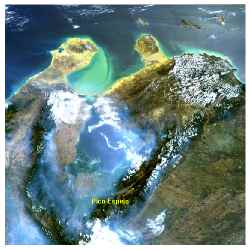
(143 kB)
Satellite picture of the northern part of South America taken by the
MERIS instrument on board ENVISAT (© ESA 2003). Clearly
visible are the Gulf of Venezuela and Lake Maracaibo. The
arrow marks the position of Pico Espejo.
The MIRA 2 radiometer is now installed on Pico Espejo
(8.5314°N, 71.0537°W, 4765 m asl) at Mérida, Venezuela. MIRA 2 is part of
the joint Venezuelan, Swedish, and German project of the
Mérida Atmospheric
Research Station (MARS).
Also installed at this inner-tropical site are the ground-based water vapour radiometer
WARAM
and a
DOAS instrument.
These instruments are operated by the
Institute of Environmental Physics of the
University of Bremen .
Measurements of the number density, size distribution, light absorption,
scattering, chemical composition and mixing state of aerosols are investigated
using a Volatility Tandem Differential Mobility Analyzer by the
Department of Apllied Environmental Science of the
Stockholm University .
Due to its high altitude Pico Espejo provides low tropospheric
water vapour column amounts and a high tropospheric transmission. Therefore
excellent conditions for ground-based measurements are
provided at this inner tropical site. Analyses using NCEP/NCAR data covering
the last 50 years suggest that nearly year-round measurements at
270 GHz will be feasible. The first results of MIRA 2 confirm the good tropospheric
conditions of this site.
Another advantage of this site is the good
accessibility of this high altitude location by the world's highest
cable car. A scientific, technical, and organizational summary in pdf-format
for this new atmospheric research station can be found here (1022 kB).

For comments mail to  |
(last modification: June 18th, 2007) | ||
|
|||